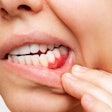A new four-year, $1.58 million grant from the National Institute of Dental and Craniofacial Research, will allow Yiping Han, PhD, an associate professor at the Case Western Reserve University School of Dental Medicine, to continue to advance her research linking certain oral bacteria to fetal death.
This is Han's third National Institute of Dental and Craniofacial Research RO1 award. She's published numerous papers from previous research related to Fusobacterium nucleatum. Over the last several years, Han has linked the bacteria to stillbirth, postbirth sepsis, and premature births due to inflammation in the placenta, which is supposed to be bacteria-free.
Of Fusobacterium's five subspecies, two have mechanisms that allow them to leave the oral cavity and travel to other parts of the body, including the placenta, Han noted in a university news release.
"We are interested in why more of some subspecies are found in the uterus and placenta, but others never leave the mouth," Han said. "We have to find out why, and then stop them."
About 700 species of bacteria live in the oral cavity, according to Han. Some, such as Fusobacterium, have developed the ability to slip between cells in blood vessel walls to enter the blood and establish "colonies" in various parts of the body, allowing other oral bacteria in. Once a colony is established, she explained, it triggers the biochemical process that creates inflammation that can develop into plaque in the heart, erosion of the bone in arthritis, or bacteria in the lungs that can cause a newborn's death.
Fusobacterium also have a mechanism to attach to cell walls and set the body's immune response in motion.
Once the bacteria cause inflammation, they become bona fide pathogens that incite diseases, the researchers said.
In a recent study, Han and Xiaowei Wang, a postdoctoral scholar in Han's lab, found that atherosclerotic disease, adverse pregnancy outcomes, rheumatoid arthritis, inflammatory bowel disease, colorectal cancer, and respiratory tract infections all had oral bacteria connections (Journal of Dental Research, June 2013, Vol. 92:6, pp. 485-491).
"Almost every disease in research literature reviewed has the presence of Fusobacterium at the diseased site," the study authors concluded.



















